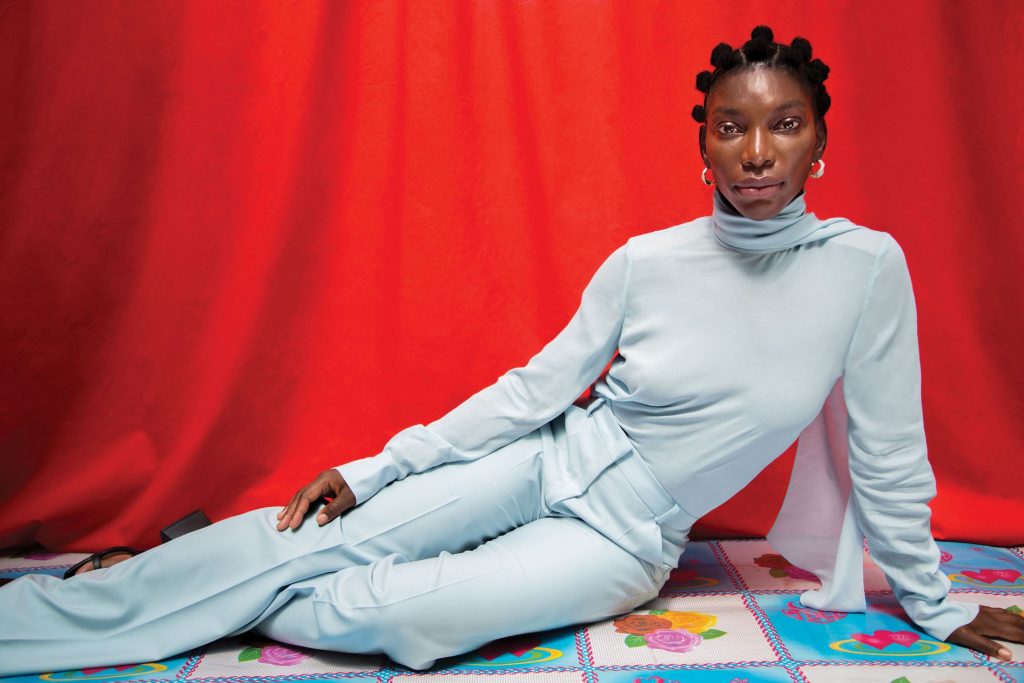By Elly Savva
*TW // R*pe & assault: This piece talks openly about details that may be triggering for survivors*
In I May Destroy You, Michaela Coel plays Arabella, a young writer from East London navigating life alongside her best friends Terry (Weruche Opia) and Kwame (Paapa Essiedu). In the pilot, Arabella pulls an all-nighter in an attempt to finish a draft for her agents but slips away in the midst of the night to grab a drink with a friend. Coming back to consciousness in the light of the morning with a blank memory of the night before, Arabella experiences a series of flashbacks that gradually bring her to the realisation that somebody had drugged and raped her.
Although labelled by some as a ÔÇÿconsent-drama’, part of the beauty of the show is that it refuses to be one thing. Whilst it is grounded in a story of sexual assault and the normalisation of rape culture in society, it is also an exploration of blackness, black queerness, trauma, and consent.┬á
Whilst Michaela Coel was writing the second season of her BAFTA award-winning show Chewing Gum, she experienced sexual assault in an attack similar to that of Arabella’s. In her recent profile for Vulture Magazine, Coel spoke about how creating the show was part of her process of making ÔÇÿsense of the senseless’ and learning how to be whole again after being ripped apart by trauma.

When she pitched her concept for the show to Netflix, they offered a $1 million upfront fee but didn’t want to let her retain any of the copyrights. After battling for some time she took her ideas to the BBC, who offered her the complete rights to her work as well as full creative control (Lesson? Never settle for less). After two and a half years of writing and an extensive 191 draft episodes, Coel produced a 12-part series which is simply outstanding from start to finish.
Whilst many fictional portrayals of sexual assault can fall short for slipping into simplistic dichotomies of innocence versus abuse, I May Destroy You stands out so well for its exploration of nuance. With a topic as uncomfortable as sexual violence, approaching the layers beneath the surface is an incredibly difficult thing to do, but is something that the show handles in an outstanding way. So-called ÔÇÿgrey areas’ are traversed such as stealthing, coercion, and acts which change from being consensual to non-consensual.
As the viewer experiences the reality of these acts, it becomes clear that these aren’t unclear territories at all. In the words of Arabella, any changes to the grounds of consent isn’t “rape-adjacent” or “a bit rapey”, it’s a form of rape. All of the three main characters experience some form of assault throughout the programme, in violations that vary from the obvious to the obscured. Following the trajectories of multiple survivors also serves as a reminder that there is no such thing as a ÔÇÿperfect victim’. The consequences that sexual violence has on people can impact on their lives in such different ways, with the paths to recovery being varied and often messy.
The arrival of the show in the summer of 2020 amongst the social uprising for Black lives also feels hugely timely. Although the white columnist Allison Pearson was allowed to publish claims in the Telegraph that IMDY was a “rebuttal of systematic racism”, the lived experience of race permeates the programme and is an inescapable part of it. Although the majority of the cast in the show are Black, the viewers of the show are reminded of the UK’s problem with institutional racism by the white doctor who misassumes Arabella’s identity, her white agents, and her white school teachers. This is particularly clear in the episodes of the show that follow Arabella and Terry when they were in school. At this point, the storyline highlights the way that innocence is presumed for white children, but the same allowances aren’t given to Black children.
At one point Terry makes the comment that “white girl tears [are] of high currency”, which is a reflection of the differential treatment at the hands of their teachers and the inherent biases of white-run institutions.
The show clearly documents white privilege for what it is, that no matter how hard your life as a white person may have been, the colour of your skin has allowed you a certain power. No matter the other hardships you may face, such as living in extreme poverty or living as a woman, the colour of your skin hasn’t been a source of your mistreatment.┬á
Whilst IMDY tackles difficult themes and is at times uncomfortable to watch, it is also a vibrant portrait of navigating modern millennial life in gentrified London that is filled with humour and warmth. Without giving too much away – the ending of the series reflects the uncomfortable reality that there are no easy answers for how to deal with the pain caused by sexual assault. Revenge doesn’t easily bring catharsis and there are no simple fixes for trauma. Although all the characters in the show are complex and make mistakes in their actions, they are also hugely supportive friends that lift each other up through their journeys to recovery. Although this show tackles so many vital aspects and troubles of contemporary life, one of my favourite things about this show was their portrayal of platonic intimacy. After all, after-party talks as the sun comes up when you’re sitting somewhere ridiculous like a bathtub can be just as vital to your well-being as therapy.┬á
All 12 episodes of I May Destroy You are available to stream now on BBC iPlayer: https://www.bbc.co.uk/iplayer/episodes/m000jyxy/i-may-destroy-you
If you have been affected by any of the topics discussed in this article, support can be found on the rape crisis website. https://rapecrisis.org.uk/. They also have a UK helpline on 0808 802 9999 that is open between 12:00-14:30 and 19:00-21:30 every day of the year.


